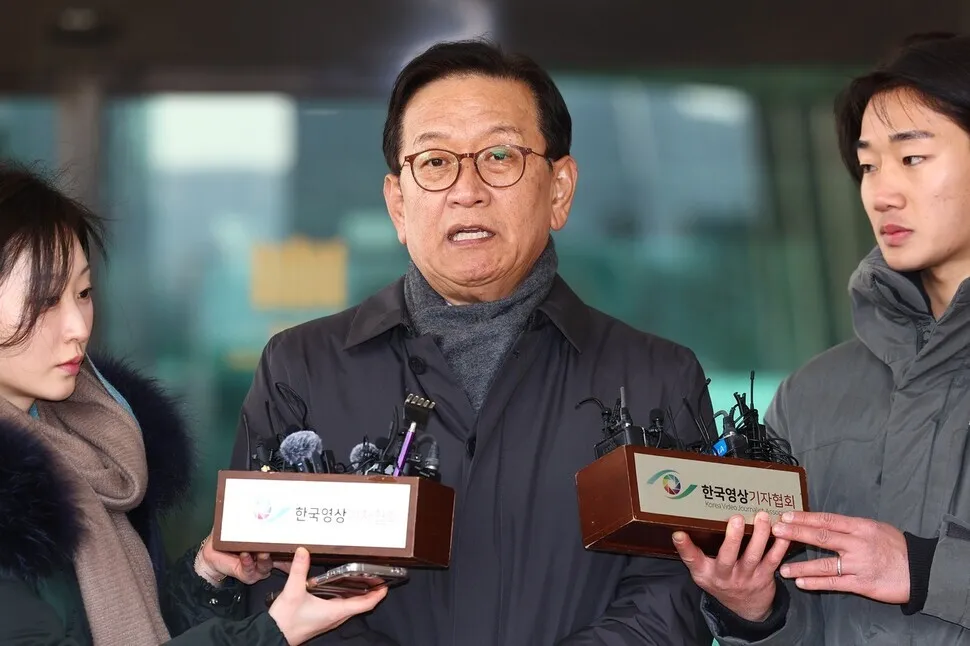hankyoreh
Links to other country sites 다른 나라 사이트 링크
[Editorial] Yoon’s feigned innocence isn’t fooling anyone

Korean President Yoon Suk-yeol, who is accused of being the ringleader of an insurrection, had his legal representatives deny all charges against him.
Amid an outpouring of testimony from other participants in the martial law declaration, Yoon nonchalantly denies all of it. That gives the lie to his pledge not to dodge legal or political responsibility for his abortive martial law declaration.
Yoon had plenty to say when he was trying to incite his followers to rise up on his behalf. But as investigators are closing in on him, he’s scrambling to stay out of custody like a petty criminal. How could the president, of all people, be such a coward?
“The president comes from a legal background. I have heard myself that he never used the words ‘arrest’ and ‘drag out,’” said Seok Dong-hyeon, the head of Yoon’s legal team, in a press conference on Thursday. Seok added that Yoon had told him he’d “never once so much as uttered the word ‘arrest.’”
Yoon’s words directly contradict testimony by Cho Ji-ho, the commissioner general of the Korean National Police Agency, and Lt. Gen. Kwak Jong-geun, head of the Special Warfare Command, that they’d personally received orders from Yoon to “drag out” the lawmakers from the main chamber of the National Assembly.
But testimony about Yoon’s orders continues to accumulate.
Lt. Gen. Lee Jin-woo, the chief of the Capital Defense Command, who sent about 200 military police to the National Assembly after martial law was declared, testified to prosecutors that he’d received a phone call from Yoon ordering him to “drag out” lawmakers while he was at the National Assembly.
When lawmakers were about to pass a resolution demanding that martial law be lifted, Yoon reportedly called Lee again to scold him for failing to drag out the lawmakers.
The reason Yoon denies giving any orders to block the National Assembly’s passage of the resolution and to arrest members of the National Assembly is because those are the key factors that will determine whether or not he’s guilty of insurrection.
Both the Criminal Act and Supreme Court precedent define subversion of the Constitution — one of the components of the crime of insurrection — as overthrowing by force constitutionally established bodies of state or making it impossible for those bodies to exercise their authority.
When former Presidents Chun Doo-hwan and Roh Tae-woo were tried in 1997 for the coup they carried out on Dec. 12, 1979, the Supreme Court said that subversion of the Constitution “does not only mean abolishing such bodies but also includes making it impossible for those bodies to carry out their proper function for a substantial period of time.”
The object of Yoon’s orders was to neutralize the National Assembly and prevent lawmakers from passing a resolution to end martial law. If he’s charged with insurrection, he’s unlikely to avoid a guilty verdict.
Yoon’s evasive maneuvers are part of a legal strategy of avoiding the charge of insurrection, which is punishable by death or life in prison.
It looks like the man who threw the country into crisis with his outdated declaration of martial law is now set on saving his own skin. How humiliating to have such a man as president.
Please direct questions or comments to [english@hani.co.kr]

Editorial・opinion
![[Column] Imperial tyranny, Korean humiliation [Column] Imperial tyranny, Korean humiliation](https://flexible.img.hani.co.kr/flexible/normal/500/300/imgdb/original/2025/0912/7617576652278449.jpg) [Column] Imperial tyranny, Korean humiliation
[Column] Imperial tyranny, Korean humiliation![[Correspondent’s column] Cognitive dissonance in MAGA world [Correspondent’s column] Cognitive dissonance in MAGA world](https://flexible.img.hani.co.kr/flexible/normal/500/300/imgdb/original/2025/0912/3417576648512186.jpg) [Correspondent’s column] Cognitive dissonance in MAGA world
[Correspondent’s column] Cognitive dissonance in MAGA world- [Editorial] Korea, US need a ‘gentlemen’s agreement’ on what job creation entails
- [Column] Why MAGA has its eyes set on Korea
- [Column] Lee still has his work cut out for him after summit with Trump
- [Editorial] Is this any way for the US to treat an ally?
- [Column] Lee’s difficult task of striking a balance on Japan
- [Editorial] Multipolar era means Seoul must broaden its diplomacy
- [Column] North and South Korea are no longer pawns in US-China-Russia relations
- [Column] Who we fail when we oversimplify the ‘comfort women’ issue
Most viewed articles
- 1Seoul says US must fix its visa system if it wants Korea’s investments
- 2North Korea said to have exposed numerous US spies after botched 2019 SEAL mission
- 3[Column] Imperial tyranny, Korean humiliation
- 4Freed workers arrive in Korea, one week after ICE raid in Georgia
- 5Korea’s president says firms will be ‘very hesitant’ about investing in US after ICE raid
- 6[Correspondent’s column] Cognitive dissonance in MAGA world
- 7Lee says he won’t sign any tariff deal with US that doesn’t benefit Korea
- 8MAGA’s traveling circus comes to Korea
- 9Korea, US to launch working group to improve visa system for Korean workers
- 10[Column] Why MAGA has its eyes set on Korea